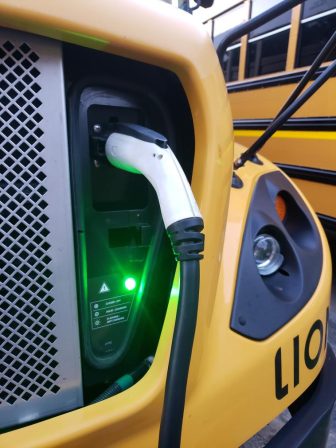
An electric bus connects to a charge port at Three Rivers Public Schools. Three Rivers Public School.
By Donté Smith
Capital News Service
“We’re rolling with the changes,” said Kathy Kochanski, the transportation coordinator for Troy Public Schools, as more school districts across Michigan adopt electric buses to reduce emissions and promote cleaner energy.
The Department of Education, in partnership with the Department of Environment, Great Lakes, and Energy, recently announced the recipients of Clean Bus Energy grants.
The initiative will support 29 districts, from Alpena to Grand Rapids, in purchasing 114 “clean” buses, primarily electric, with the possibility of including propane and natural gas models.
“Things are still up in the air because it was announced recently, but we’re excited,” Kochanski said.
An analysis by the Electric School Bus Initiative indicates that the total cost of ownership for electric school buses can be higher upfront than for diesel buses. Electric buses typically range from $300,000 to $400,000, while diesel buses cost around $100,000 to $120,000.
However, the analysis notes that operating costs for electric buses can be lower due to factors such as cheaper electricity and reduced maintenance needs. The initiative suggests that those potential savings could lead to substantial long-term financial benefits.
Among the other districts receiving grants are Allendale Public Schools, Ludington Area Schools, Pellston Public Schools, Kalkaska Public Schools, Saline Area Schools, Kentwood Public Schools and Three Rivers Community Schools.
Kochanski, said the Troy fleet is less than 10 years old and expressed enthusiasm about participating in the shift toward electric vehicles.
“Our current buses aren’t that old, but we’re excited to be pioneers in the transition to electric,” she said. “Being on the ground level of change like this is exciting, especially when thinking about the future of transportation.”
Kochanski acknowledged the logistical challenges of integrating electric buses into the current all-diesel fleet but emphasized that the district plans to use them on “daily routes that can be easily adjusted if issues arise.”
For Allen Park Public Schools, the transition presents both excitement and challenges, according to Patrick Ward, the district’s transportation director.
Ward highlighted the financial relief the switch in fuels will provide. “The two buses being replaced have been running since 1998 and have been costing a lot to keep alive.”
He said the district’s maintenance team will require extensive training, and its garage will need updates to accommodate the heavier electric vehicles.
Despite these hurdles, Ward said he remains optimistic: “Eventually, things will shift toward electric, I think. We’re at the front of that change, and it’s a good place to be.”
The Education Department notes that the grant program – part of the state’s broader 2024 school aid budget – aims to reduce emissions and improve air quality by transitioning from diesel to low-emission buses.
State Superintendent of Instruction Michael Rice said, “The program supports Michigan’s Top 10 Strategic Education Plan by improving the health, safety and wellness of learners.”
However, districts like Allen Park are approaching the transition with caution, especially concerning winter performance.
Ward said, “We get some rough winters in Michigan, so we can use the electric buses as ‘reserve’ if we expect battery issues.”
A recent survey by the Department of Environment, Great Lakes, and Energy of seven districts that received Fuel Transformation Program grants in 2019 for electric buses revealed mixed results.
Four districts reported no cold-weather problems, while one district noted, “Battery loss was a factor only in slippery winter conditions when regenerative braking had to be switched off.” Regenerative braking, which captures energy during braking to recharge the battery, is not necessary for the vehicle’s operation but can improve efficiency.
The department says the Clean School Bus program is part of broader infrastructure spending aimed at balancing educational advancements and environmental sustainability.
Department Director Phil Roos emphasized the importance of both state and federal initiatives in advancing Michigan’s clean transportation efforts.
“The commitment by the state and federal governments to provide schools with more environmentally friendly buses is good for our children, good for our schools, and good for our communities,” Roos said.
As these efforts grow, “My grandkids will probably see a lot more electric vehicles when they start driving,” Ward said. “The shift is inevitable.”